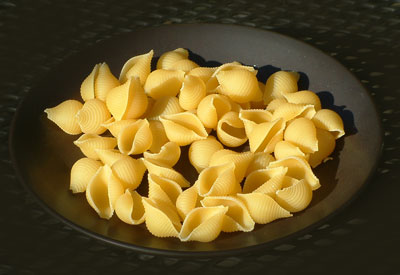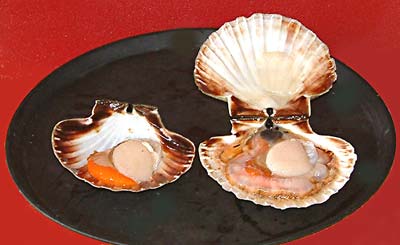"With artichokes", often cooked in white wine with garlic, tomatoes and pancetta and then served with rice or short pasta such as penne or rigatoni.
The meat of a young, castrated ram stewed with onions, tomatoes and stock flavoured with cinnamon and rice.
"With Tuna caviar", ie with tuna roe, sealed in oil and rendered to a paste which may then be served with pasta.

"Conch shells." Pasta shells in various sizes based on the shape of a conch shell. Can be smooth or ridged.
Clams on the half shell stuffed and wrapped in paper or foil and baked. The stuffing could be just an egg yolk with a little brandy, topped with Parmesan cheese.

Pilgrim or great scallops. These are shellfish with white meats and pink corals, often cooked in their shells with the corals and have sweet, succulent meat if properly cooked. According to legend, the body of St James (St-Jacques) travelled with a boat with neither oars nor sails around the Iberian coast, coming to rest in Compostela. Many miracles were associated with this journey, including one where the horse of a pagan nobleman leaped into the sea. They emerged carrying the body of St James covered in scallop shells. This resulted in the nobleman converting to Christianity. Pilgrims to Santiago de Compostela have traditionally worn scallop shell badges in commemoration of St James, or used scallop shells as begging bowls. The whole pilgrim route is decorated with his emblem. In some parts of Europe they are eaten on the feast day of St James on 25 July to commemorate the arrival of pilgrims or peregrinos at Santiago de Compostela, often with tomatoes and garlic. They are more often simply and lightly fried.